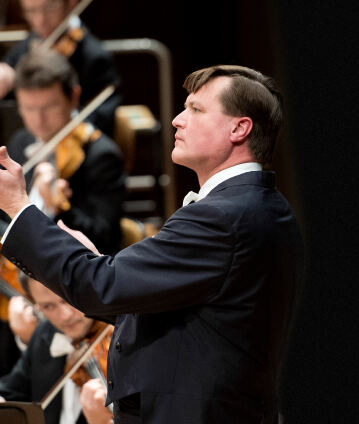Christian Thielemann conducts choral works by Johannes Brahms

Brahms composed choral music throughout most of his life. It is not only this regularity but also the emotional depth and range of these works that allow us to sense how particularly important they were to the composer. Here, Christian Thielemann, the Rundfunkchor Berlin and the Berliner Philharmoniker presented several of the most beautiful of Brahms’s choral works. The programme also includes Schoenberg’s late-Romantic colossal tone poem, Pelleas und Melisande.
The choirmaster and conductor John Eliot Gardiner once said about Brahms’s choral music: “They were the vessels for some of his most profound thoughts, revealing at times an almost desperate urge to communicate things of import. Solemnity, pathos, terror and jubilation are all experienced and encapsulated.” Here, Christian Thielemann, one of the most notable interpreters of German late-Romantic music, conducted three of these works: Nänie, Gesang der Parzen and Schicksalslied, with the Rundfunkchor Berlin, partners of the Berliner Philharmoniker for many years, taking on the choral role.
He then conducted Arnold Schoenberg’s tone poem Pelleas und Melisande: a work that retells Maurice Maeterlinck’s eponymous drama of jealousy with late Romantic fervour and sonority audibly inspired by Richard Wagner and Richard Strauss. The response from the audience and the press to Thielemann’s performance was rapturous. Das Neue Deutschland wrote: “His striving for clear structures and a vibrant sound development was downright triumphant. Intensive, even passionate expressiveness right to the dark ending. The orchestra was magnificent, inspired to even higher musical heights and charisma by Christian Thielemann.”
© 2009 Berlin Phil Media GmbH
Related interviews
Artists
Our recommendations
- Donald Runnicles conducts a concert “à la française”
- Murray Perahia and Simon Rattle with Schumann’s Piano Concerto
- Nicola Luisotti conducts Poulenc’s Gloria and Prokofiev’s Fifth Symphony
- Kirill Petrenko conducts Tchaikovsky’s “Mazeppa”
- A Verdi evening with Christian Thielemann
- Kirill Petrenko conducts Beethoven’s Ninth Symphony at the Brandenburg Gate